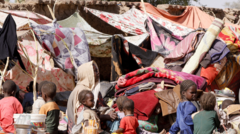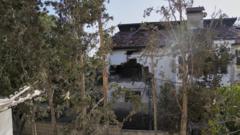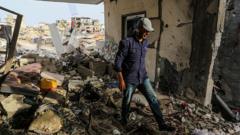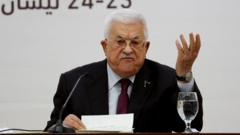The ongoing Israeli blockade has resulted in the UN World Food Programme exhausting its food supplies in Gaza, threatening the survival of its community kitchens that provide daily meals to the displaced population. The situation has rapidly deteriorated, with malnutrition on the rise and severe shortages of essential goods. Calls for the reopening of aid corridors have intensified as desperation among the local population grows.
Humanitarian Crisis Deepens in Gaza as UN Food Aid Runs Out Amid Israeli Blockade

Humanitarian Crisis Deepens in Gaza as UN Food Aid Runs Out Amid Israeli Blockade
The UN World Food Programme announces depletion of food stocks in Gaza, amid intensified Israeli restrictions that have exacerbated the humanitarian situation.
The UN World Food Programme (WFP) has announced that it has run out of food aid in Gaza as a result of an ongoing Israeli blockade that has lasted for seven weeks. The WFP stated that its last remaining food stocks were delivered to community kitchens in the region, which are reportedly on the verge of emptying their supplies within days. The blockade, which began on March 2, coincided with an Israeli military offensive launched after a ceasefire collapsed, aimed at pressuring Hamas to free remaining hostages.
Despite international law obligating Israel to facilitate the provision of supplies for the 2.1 million Palestinians in Gaza, Israeli authorities maintain that they are complying with legal mandates and assert that there is no actual shortage of aid. However, the situation on the ground paints a starkly different picture. Each of the 25 bakeries supported by WFP was forced to close at the end of March due to a lack of essential ingredients like wheat flour and cooking fuel. The distribution of food parcels, which contained two weeks' worth of rations, has also ended.
The rise in malnutrition levels is alarming, with reports indicating that from a population of 1,300 children screened last week, over 80 cases of acute malnutrition were confirmed—a number that has doubled in recent weeks. The UN's Office for the Co-ordination of Humanitarian Affairs (OCHA) highlighted similar shortages in medical supplies, placing further strain on already overwhelmed healthcare facilities amid continued Israeli airstrikes.
World Health Organization (WHO) director-general Dr. Tedros Adhanom Ghebreyesus expressed deep concern, stating that Gaza has reached an "awful and grim moment," urging for an immediate end to the blockade as lives hang in the balance. The WFP outlined the devastating impact of the blockade on markets and food systems, stating that food prices surged by up to 1,400% since the ceasefire ended, creating severe nutrition concerns among vulnerable groups, including children, pregnant women, and the elderly.
WFP issued a call to action, urging all parties involved to prioritize civilian needs and permit aid to enter Gaza without delay, highlighting that over 116,000 tonnes of food assistance is awaiting delivery at aid corridors, pending the reopening of borders. In response to the increasing need, WFP Country Director Antoine Renard noted that hot meal kitchens are essential for the displaced population, which has seen over 80% of its members forced from their homes due to the ongoing conflict.
As supplies dwindle, residents are resorting to bartering goods or selling their possessions to procure food, while instances of begging are escalating, reflecting unprecedented levels of desperation. The Israeli foreign ministry dismissed recent criticisms from the UK, France, and Germany about the blockade, asserting that they had facilitated the entry of significant aid during the ceasefire and claiming that humanitarian supplies are being misappropriated by Hamas.
Hamas, for its part, has rejected an Israeli proposal for a new ceasefire, demanding full withdrawal from Gaza and the release of all remaining hostages in exchange for stopping hostilities. The ongoing military campaign against Hamas, which began following a large-scale attack on October 7, has resulted in significant casualties, with reports stating over 51,000 fatalities among Gazans since the conflict resumed. The situation remains precarious, illustrating the deepening humanitarian crisis facing Gaza as international calls for assistance grow louder.


















